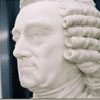Q & A On The Principles Of Mystic Wisdom
 as given by Masters of Mystic Wisdom (compilation by Vernon Howard)
as given by Masters of Mystic Wisdom (compilation by Vernon Howard)
1. Q: May I come right to the point? What are mystical studies all about? Are they practical? What will they do for us?
A: If you devote your time to study, you will avoid all the irksome things of life, and you will not long for the approach of night, being tired of the day, and you will not be a burden to yourself, and your company will be acceptable to others. (Seneca)
2. Q: But do these lofty mystical principles help us in daily matters, such as the solving of problems and in the making of necessary decisions? Heavenly ideas have their place, but we need down-to-earth assistance.
A: The contemplation of celestial things will make a man both speak and think more sublimely and magnificently when he descends to human affairs. (Cicero)
3. Q: What about the control of personal habits? Can these principles give us a new and a complete command over ourselves, including the removal of unwanted habits?
A: Even the food and drink necessary for restoration will lie outside the soul’s attention, and not less the sexual appetite … it will turn upon the actual needs of nature and be entirely under control. (Plotinus)
4. Q: I don’t have any large personal problems, but am puzzled by life in general. For example, why are we here on earth, and what am I supposed to be doing with myself?
A: We are surrounded by a rich and fertile mystery. May we probe it, pry into it, employ ourselves about it, a little? (Thoreau)
5. Q: Then there is a definite answer regarding the purpose of life?
A: To be what we are, and to become what we are capable of becoming, is the only aim of life. (Spinoza)
6. Q: I have always yearned to simply be myself, but tell me, how does it contribute to personal happiness?
A: Resolve to be thyself; and know, that he who finds himself, loses his misery. (Arnold)
7. Q: What will be the signs that we are solving these mysteries of life for ourselves?
A: To be happy, to possess eternal life, to be in God, to be saved — all these are the same. All alike mean the solution of the problem, the aim of existence. And happiness is cumulative, as misery may be. An eternal growth is an unchangeable peace, an ever more profounder depth of understanding, a possession constantly more intense and more spiritual with the joy of heaven — this is happiness. Happiness has no limits. (Amiel)
8. Q: I want to work at self-transformation, but I have no confidence in my mental abilities to understand what I must do.
A: We can be men without being sages. Without spending our days in the study of morality, we possess at a cheaper rate a more certain guide through the immense and perplexing labyrinth of human opinions. It is not enough, however, that such a guide exists — it is necessary to know and follow her. (Rousseau)
9. Q: What is this authentic guide?
A: Be a lamp unto yourself. (Buddha)
 You are wiser than you think!
You are wiser than you think!
10. Q: I would give anything to be sure that my fate is not forever fixed, that I can really break completely away from my present negative patterns and enter a new way.
A: A strict belief in fate is the worst of slavery, imposing upon our necks an everlasting lord and tyrant, who we stand in awe of night and day. (Epicuras)
11. Q: Then change and elevation of both self and circumstance is truly possible?
A: Man is man, and master of his fate. (Tennyson)
12. Q: In this world of rapid changes, all of us seem to be seeking something more secure and permanent. Will you please comment on this?
A: One truth discovered is immortal, and entitles its author to be so: for, like a new substance in nature, it cannot be destroyed. (Hazlitt)
13. Q: But maybe only certain types of people are able to set off on the mystic path. Or maybe we can take it up only when we have enough money or leisure; when we are free of the demands of everyday life.
A: You think it is because I have an income which exempts me from your day-labor, that I waste (as you call it) my time in sun-gazing and stargazing. You do not know me. If my debts, as they threaten, should consume what money I have, I should live just as I do now: I should eat worse food, and wear a coarser coat, and should wander in a potato patch instead of in the wood — but it is I, and not my twelve hundred dollars a year, that love God. (Emerson)
14. Q: I am aware that we must make personal efforts, but I am not sure as to what they are.
A: Ask, and it shall be given you; seek, and ye shall find; knock, and it shall be opened unto you: for every one that asketh receiveth; and he that seeketh findeth; and to him that knocketh it shall be opened. (Jesus)
15. Q: Feelings of inferiority have always prevented me from attempting to climb the mountain. I often think that I lack the necessary inner qualities.
A: On the other hand, we are often wiser than we fancy ourselves to be…. In the great moments of life, when a man decides upon an important step, his action is directed not so much by any clear knowledge of the right thing to do, as by an inner impulse — you may almost call it intuition — proceeding from the deepest foundations of his being. (Schopenhauer)
16. Q: But what if we have limited time for attending to the inner life?
A: One day, with life and heart, is more than time enough to find a world. (Lowell)
 Your path to lasting delight!
Your path to lasting delight!
17. Q: Sometimes I find myself letting go of the mad rush of daily duties to wonder about myself and my activities. Surely there is something higher for us than the usual pursuits of making money and raising families. Do other people also have this feeling of wonder?
A: But often in the world’s most crowded streets, but often, in the din of strife, there rises an unspeakable desire after the knowledge of our buried life, a thirst to spend our fire and restless force in tracking out our true, original course; a longing to inquire into the mystery of this heart that beats so wild, so deep in us, to know whence our thoughts come and where they go. (Arnold)
18. Q: Will you please supply an example of a practical esoteric truth which needs our sincere study in order to make its value our own value?
A: Without going out of doors, one may know the whole world; without looking out of the window, one may see the way of heaven. The further one travels, the less one may know. Thus it is that without moving you may know; without looking you shall see; without doing you shall succeed. (Lao-tse)
19. Q: I often feel enslaved by compulsive duties. I do them because I feel I must or should do them. Because of this, I am a whirlpool of resentment and guilt. Is it wrong to want to break out of this nightmare and to start living my own life?
A: I would have nobody to control me; I would be absolute…. Now, he that is absolute can do what he likes; he that can do what he likes can take his pleasure; he that can take his pleasure can be content; and he that can be content has no more to desire. So the matter is over, and come what will come, I am satisfied. (Cervantes)
20. Q: I have always had a timid and apologetic attitude towards other people, which I dislike. I am encouraged by everything you say, but I am still what I am.
A: I do not trouble my spirit to vindicate itself or be understood; I see that the elementary laws never apologize. (Whitman)
21. Q: So how can I set myself free?
A: Who has bound you? (Zen)
22. Q: I sense something very right and very reassuring about everything we have covered so far. Will you please explain this feeling?
A: These are not fictions of a visionary imagination, but sober truths, spoken by the word of God in scripture, and written and engraven in the book of every man’s own nature. (Law)
23. Q: Most of us have false values of one kind or another. We need guidance in exchanging shallow activities for more profitable ones. Please suggest a method.
A: There is nothing so delightful as the hearing or the speaking of truth. For this reason, there is no conversation so agreeable as that of a man of integrity, who hears without any intention to betray, and speaks without any intention to deceive. (Plato)
24. Q: Will authentic values become clearer to us as we watchfully proceed?
A: Evident as the sun at noon. (Carlyle)
 The interesting discoveries you will make!
The interesting discoveries you will make!
25. Q: Suppose we reach this state of inner unity. Does this mean that the people and circumstances that now disturb us can have no more influence on our peace of mind?
A: No matter where you place it, gold is gold. (Ramakrishna)
26. Q: What results have been obtained by those people who have dived deeply into esoteric waters? I mean, have they found special rewards in this inner world?
A: It was my conviction that I could not do better than continue in that in which I was engaged, … in making the greatest progress I was able in the knowledge of truth…. This method, from the time I began to apply it, has been to me the source of satisfaction so intense as to make me believe that a more perfect or more innocent occupation could not be enjoyed in this life. By its means, I daily discovered truths that appeared to me of great importance, and of which other men were generally ignorant. The arising satisfaction so occupied my mind that I was wholly indifferent to every other object. (Descartes)
27. Q: What discovered truth would open the door to lasting self-contentment?
A: He is happy as well as great who needs neither to obey nor to command in order to be something. (Goethe)
28. Q: Does the absorption of mystic principles provide a man with the endurance needed for going on to new successes?
A: No man could ever make him face about. (Bunyan)
29. Q: To summarize at this point, why is it necessary for us to study these mystical and esoteric teachings?
A: The true sovereign of the world, who molds the world like soft wax, according to his pleasure, is he who lovingly sees into the world. (Carlyle)
30. Q: I am easily upset by unexpected events which force me to change my plans. It is more annoying than tragic, still, it is no way to go through the day. May I have your comment?
A: The man of inner life is easily aware of himself, since he is never totally absorbed in outward affairs. Therefore, his exterior occupations and necessary activities do not distract him, and he adjusts himself to things as they come. The man whose inner life is well-ordered is not bothered by strange and troublesome ways of others. A man is blocked and distracted by such things only as he permits himself to be. (Kempis)
31. Q: Why are these great principles not known and practiced by mankind as a whole?
A: The secrets of life are not shown except to sympathy and likeness. (Emerson)
32. Q: In other words, each person must eagerly want them for himself?
A: Dare to be wise! (Horace)
 How your natural forces help you!
How your natural forces help you!
33. Q: Everything seems to depend upon the source we look to for help. What rule can we follow?
A: Set your affection on things above, not on things on the earth. (New Testament)
34. Q: Why do we fail so often in our attempts to win what we want? Why do results so often turn out contrary to our desires?
A: We, ignorant of ourselves, beg often our own harms, which the wise powers deny us for our good; so find we profit by losing of our prayers. (Shakespeare)
35. Q: Please explain what you mean by human ignorance.
A: By closing the eyes and slumbering, and consenting to be deceived by shows, men establish and confirm their daily life of routine and habit everywhere, which still is built on purely illusory foundations. Children, who play life, discern its true law. (Thoreau)
36. Q: How can we awaken our natural powers and turn them to practical use?
A: The mason employed on the building of a house may be quite ignorant of its general design, or, at any rate, he may not keep it constantly in mind. So it is with man: in working through the days and hours of his life, he takes little thought of its character as a whole…. It is only when we come to view our life as a connected whole that our character and capacities show themselves in their true light; that we see how, in particular instances, some happy inspiration, as it were, led us to choose the only true path out of a thousand which might have brought us to ruin. (Schopenhauer)
37. Q: Then it is correct to say that all wisdom is really self-wisdom?
A: The kingdom of heaven is within. (Jesus)
38. Q: I believe I understand this, but let me review. If we work and solve the mysteries of ourselves, we solve all other mysteries?
A: As a man-of-war that sails through the sea, so this earth that sails through the air. We mortals are all on board a fast-sailing, never-sinking world-frigate, of which God was the ship-wright…. Thus sailing with sealed orders, we ourselves are the repositories of the secret packet, whose mysterious contents we long to learn. There are no mysteries out of ourselves. (Melville)
39. Q: No matter how hard I try to shake it off, a deep feeling of loneliness clings to me. I was told that mysticism has a new and workable solution to this problem, but I wonder whether I will be able to grasp it.
A: An heir finds the title-deeds of his house. Will he say, “Perhaps they are forged?” and neglect to examine them? (Pascal)
40. Q: How can we aid our own self-work?
A: Patience is powerful. (Longfellow)
A technique for pleasant living!
41. Q: What healthy changes will come to us as a result of acquiring information of a mystical nature?
A: From this kind of knowledge arises the most perfect satisfaction and contentment. (Spinoza)
42. Q: I would like to use my mind for the specific purpose of avoiding hurt feelings when dealing with other people. How can I do this, for example, when I am criticized or slandered by someone?
A: Say nothing more to yourself than what the first appearances report. Suppose that it has been reported to you that a certain person speaks ill of you. This has been reported, but that you have been injured has not been reported…. Thus then always abide by the first appearances, and add nothing yourself from within, and then nothing hurtful happens to you. (Aurelius)
43. Q: What if we make foolish mistakes along the spiritual path?
A: I will go a thousand leagues in falsehood, that one step of the journey may be true. (Sufism)
44. Q: Why do we fail to learn from our mistakes?
A: The fox condemns the trap, not himself. (Blake)
45. Q: Speaking of mistakes and illusions, Shakespeare said that nothing is what it seems. Does this apply to human friendships?
A: What men have given the name of friendship to is nothing but an alliance, a reciprocal accommodation of interests, an exchange of good offices; in fact, it is nothing but a system of traffic, in which self-love always proposes to itself some advantage. (La Rochefoucauld)
46. Q: What simple rule can we rely upon for right behavior at all times under all circumstances?
A: What is rational is real, and what is real is rational. (Hegel)
47. Q: I am attracted to esoteric teachings because they point the way back to the simple and natural life. Will you please supply a technique for recovering naturalness?
A: Be neither the slave of your impulses and sensations of the moment, nor of an abstract and general plan; be open to what life brings from within and without, and welcome the unforeseen, and give to your life unity, and bring the unforeseen within the lines of your plan. Let what is natural in you raise itself to the level of the spiritual, and let the spiritual become once more natural. Thus will your development be harmonious. (Amiel)
48. Q: People chatter so much about inner freedom, but few seem to really possess it. How can we start to understand the true meaning of self-liberty?
A: The wish to untie, through understanding of their true nature, the chains of selfishness and sensuality — this is the yearning for freedom. (Shankara)
49. Q: I sense how practical all this really is, but hope it is a sunny path as well.
A: Cheerful, and yet profound, like an October afternoon. (Nietzsche)
50. Q: No longer do I believe in what human beings carelessly label as love; however, authentic love must have a part in mystical wisdom. What is an elementary lesson?
A: Love is ever the beginning of knowledge, as fire is of light. (Carlyle)
Excerpt from The Mystic Masters Speak!
Posted in Other Topics, Self-help, Spiritualitywith no comments yet.






Leave a Reply